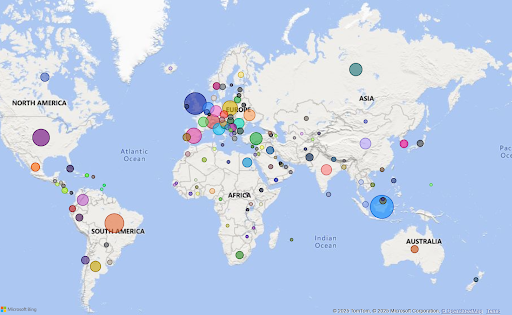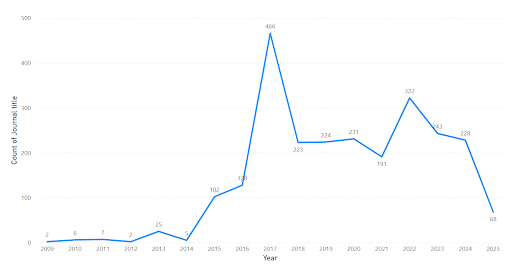Indonesian open access journals serve both academic audiences and broader communities. Ikhwan Arief, DOAJ Ambassador for Indonesia, discusses the rapid growth of open access journals in Indonesia and their inclusion in DOAJ
As of March 2025, Indonesia has become the leading contributor to the Directory of Open Access Journals (DOAJ), with 2,473 journals indexed, surpassing all other countries, including the United Kingdom (2,176), Brazil (1,578) and the United States (1,223). Representing approximately 11.5% of the 21,457 journals currently listed in DOAJ, Indonesia’s position reflects the country’s significant investment in open access publishing and its sustained commitment to equitable knowledge dissemination. Among the total indexed journals, 2,441 have unique titles, while a small number share the same title. This is permitted under the ISSN system, which allows for identical journal names as long as each carries a distinct ISSN.

Source: DOAJ public data dump
A defining feature of this ecosystem is its institutional character. As many as 2,132 journals operate under the .ac.id domain, which is designated for academic institutions in Indonesia. This underscores the dominant role of universities in hosting and managing journals. Institutions have served as key drivers of open access through university-based platforms, editorial boards, and information systems, ensuring operational sustainability and adherence to global publishing standards.The timeline of journal inclusion in DOAJ reveals a clear pattern of accelerated growth. Between 2009 and 2014, journal inclusion remained relatively modest, with fewer than 10 titles added per year in most cases. A turning point occurred in 2015, followed by a steep increase from 2016 to 2017, when 466 Indonesian journals were indexed in a single year.This surge reflects the convergence of several factors, including heightened awareness of open access, stronger national research mandates when the Indonesian government introduced Sinta (Science and Technology Index) in 2017, and expanded institutional capacity to meet DOAJ criteria. After 2017, the number of indexed journals stabilized, with annual additions ranging between 191 and 322. In 2025 (up to March), 68 journals have already been added, suggesting a continuing, if somewhat moderated, pace of growth.

Indonesian journals employ a balanced financial model. Out of the 2,473 journals indexed, 1,346 have no article processing charges (APCs), allowing authors to publish without fees. These journals often benefit from institutional or government support. The remaining journals operate on a cost-recovery basis to fund editorial processes, peer review systems, and platform maintenance.
In terms of copyright, 730 journals allow authors to retain unrestricted copyright, through open licensing frameworks, mainly from the Creative Commons. This reflects a growing alignment with international open access norms and an increasing emphasis on author rights. Meanwhile, 397 journals continue to retain copyright at the journal or publisher level, a practice that may reflect legacy policies or institutional preferences.
A key component of scholarly best practice is the use of persistent article identifiers. Among Indonesian journals, 1,924 use Digital Object Identifiers (DOIs), supporting citation accuracy, long-term access, and digital interoperability. However, 548 journals do not use any persistent identifier, a gap that limits article traceability and discoverability. Expanding the use of DOIs across all journals will be critical to enhancing the visibility and durability of Indonesian research.
Indonesian journals also reflect broad subject coverage, underscoring the country’s intellectual diversity and societal focus. Visualization of journal titles by subject shows strong representation in education, social sciences, general science, technology, engineering, medicine, psychology, religion, law, agriculture, and language. Many journals publish research with direct application to local development, such as public health, environmental studies, and Islamic education. This thematic range illustrates how Indonesian open access journals serve both academic audiences and broader communities.

The rapid expansion of Indonesia’s presence in DOAJ has been supported by a combination of policy, infrastructure, and cultural values. National regulations link DOAJ inclusion to journal performance evaluations, research incentives, and academic promotion. Culturally, there is a strong commitment to knowledge sharing as a public good. This social dimension of scholarly communication makes open access in Indonesia not merely a technical endeavour but a reflection of national academic values.
As Indonesia continues to lead in DOAJ, maintaining quality, transparency, and sustainability will be essential. The immediate priorities are strengthening metadata, archiving systems, editorial standards, and persistent identifier adoption. Greater attention to international collaboration and multilingual accessibility may further enhance the global reach of Indonesian journals.
Indonesia’s achievement as the top contributor to DOAJ demonstrates the transformative potential of open access when supported by strategic policy, institutional infrastructure, and cultural engagement. Indonesia is setting an international example through a decentralised, university-led model in inclusive and accessible scholarly publishing. DOAJ remains committed to supporting this progress and to working in partnership with Indonesian journals as they continue to innovate and lead.
Ikhwan Arief is a faculty member in the Industrial Engineering Department at Universitas Andalas, Indonesia. Ikhwan has previously managed the University’s library information system, including establishing the online public access catalogue (OPAC) and the repository servers. Ikhwan joined DOAJ in 2018 as an ambassador, then became a volunteer editor and joined the DOAJ Team as Managing Editor in 2024.
